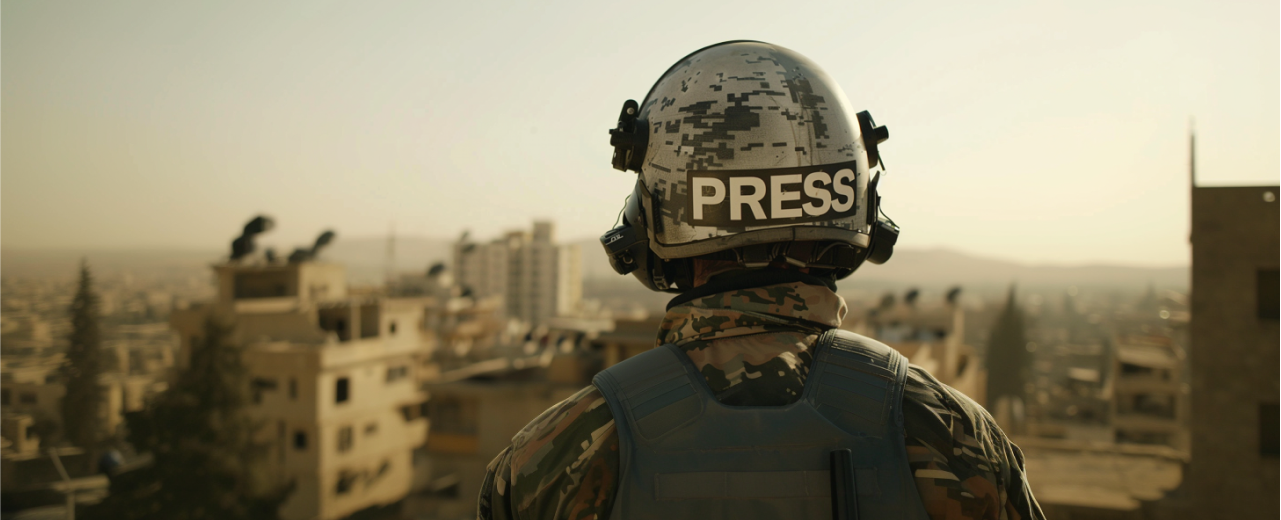 A safe time out for vulnerable media professionals
A safe time out for vulnerable media professionals
Training and support to inform the world in safety
News about war crimes in Ukraine, revelations of human rights violations in China, pictures of the expulsion of the Rohingya from Myanmar or even the publication of the Panama Papers - access to independent information and critical reporting is a given for people in Germany, as well as in many other countries. Every day we can read, hear or watch current news from all over the world in a wide variety of media and formats. But are we also aware that injustice, abuse of power or corruption only become visible when courageous journalists report on them? Media professionals often put their own lives at risk for their research and even have to fear for the safety of their families. In order to be able to continue their journalistic work, journalists and media professionals in countries with restricted press freedom need a safe environment and support.
Necessity
Protection and training for particularly vulnerable media professionals from around the world
Activity
The NGO covers all costs incurred and facilitates digital security training, language courses and, if necessary, psychotherapy
Countable effort
Number of days that particularly vulnerable journalists and media professionals can safely spend in Berlin
Result
Media professionals are protected, trained and empowered through digital security training and psychotherapy
Systemic effect
Enhanced digital literacy and self-confidence improves the security situation of media professionals
Background
Information is the first step towards change – that is why not only authoritarian governments fear independent journalism. If journalists are not allowed to report on injustice, abuse of power or corruption, the people in these countries lack free access to information. There can be neither public oversight of political decisions nor freedom of opinion. Human rights violations do not come to light. When media professionals in countries with limited press freedom report on these issues, they are often targeted by the governments. They are threatened, persecuted, imprisoned or prevented from doing their research by digital surveillance. The number of media professionals in prison rose to a record high in 2021. Worldwide, at least 488 journalists and media professionals were in prison for their work (Reporters Without Borders, 2021). This development is mainly attributable to a handful of countries whose governments are trying to suppress democratic aspirations. In Myanmar, where the military retook power in a coup in 2021, 53 journalists were imprisoned (Reporters Without Borders, 2021a). In Belarus, President Alexander Lukashenko is cracking down on media professionals after his controversial re-election: 32 of them were in prison at the end of 2021, many for covering demonstrations (ibid). The threat posed to journalists by digital surveillance is also increasing. Oppressive governments are increasingly using spyware to suppress critical opinions and silence media professionals (Amnesty International, 2021). The pressure on journalists in such countries is enormous. A safe space and comprehensive training on digital security are therefore essential.
The good deed
With your good deed today, you are helping to bring threatened journalists from all over the world to Berlin for six months. You are helping them to regain their energy in a protected space and to resume their journalistic research without fear of being threatened. You also enable digital security training, which educates them about surveillance attacks and shows them possible countermeasures. During this time, the media professionals receive continuous support (including psychotherapy if they choose) to help them deal with traumatic experiences such as threats, arrests or even the loss of colleagues. With offers such as language courses, they raise their profile and can therefore have a greater international presence. In this way, you help media professionals to live for six months without constant fear and then to stand up for freedom of the press and of opinion.

About Germany
Berlin
Capital
83,129,285
Number of inhabitants
50,801.8
Gross domestic product per capita per year
Rang 9 von 191
Human Development Index
In the 2022 press freedom ranking, Germany is in 16th place (2021: 13th) and is in the upper range of EU countries. In 2021, RSF counted at least 80 attacks against media professionals in the country (Reporters Without Borders, 2022; Reporters Without Borders 2022b).
About the organization and further information
Association
Reporter ohne Grenzen e.V.
Website
https://www.reporter-ohne-grenzen.de/


Further information and source
- Reporter ohne Grenzen e.V., 2021. Jahresbilanz der Pressefreiheit 2021. Reporter ohne Grenzen e.V., Berlin.
- Süddeutsche Zeitung, 2021. Pegasus ist eine mächtige Überwachungssoftware. Sie soll helfen, Terrorismus und Verbrechen zu verhindern. Süddeutscher Verlag, München.
- Reporter ohne Grenzen e.V., 2021 a. Höchste Zeit zu handeln. Reporter ohne Grenzen e.V., Berlin.
- Amnesty International, 2021. „Projekt Pegasus“: Spionage-Software späht Medien, Zivilgesellschaft und Oppositionelle aus. Amnesty International, Berlin.
- Reporter ohne Grenzen e.V., 2021 c. Rangliste der Pressefreiheit 2021. Reporter ohne Grenzen e.V., Berlin.




